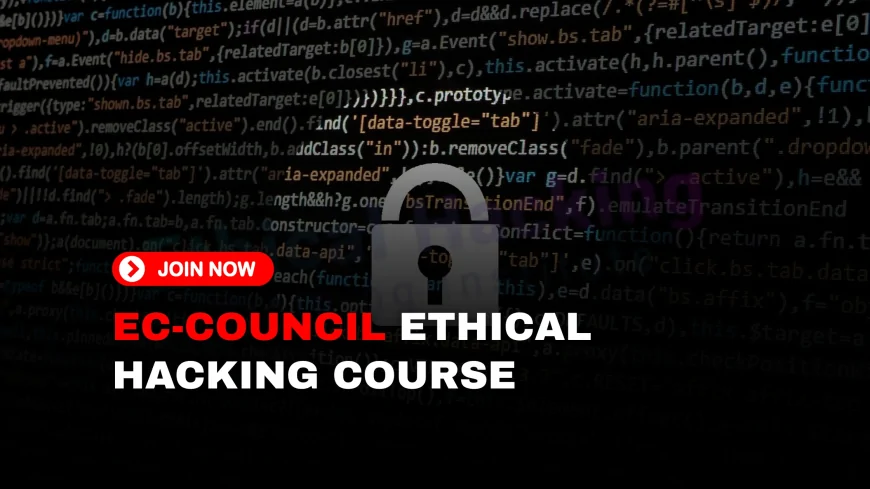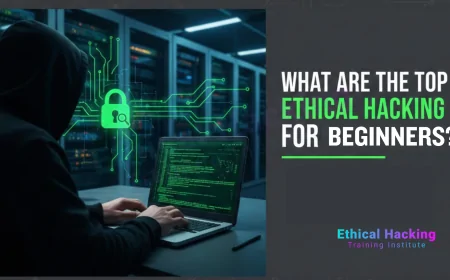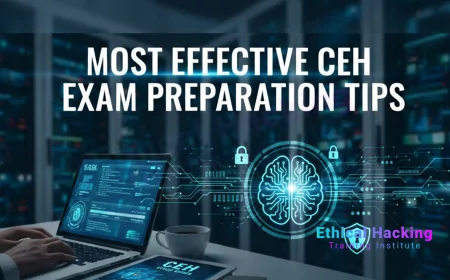EC Council Ethical Hacking Course: A Comprehensive Learning Path for Aspiring Cybersecurity Experts | A Beginner-to-Expert Learning Path with EC-Council’s Ethical Hacking Course
Explore the EC-Council Ethical Hacking Course—from Ethical Hacking Essentials to CEH certification. Learn about modules, labs, training formats, and career paths in cybersecurity.

Table of Contents
- Introduction
- Phase 1: Ethical Hacking Essentials (E|HE)
- Phase 2: Certified Ethical Hacker (CEH)
- Hands‑On Labs & EC‑Council iLabs
- Training Delivery Formats
- Certification & Career Progression
- Career Outcomes & Industry Value
- FAQs
- Conclusion
Introduction
The EC‑Council offers a well-structured learning trajectory—from foundational knowledge in the Ethical Hacking Essentials (E|HE) to the globally respected Certified Ethical Hacker (CEH). This article guides aspiring cybersecurity professionals through every stage—from intro-level training to job-ready certification.
Phase 1: Ethical Hacking Essentials (E|HE)
Ethical Hacking Essentials (E|HE) is the ideal starting point for individuals who are new to cybersecurity and aspire to become ethical hackers. Offered by EC-Council as part of its Essentials Series, E|HE provides foundational knowledge of cybersecurity principles, attack vectors, and ethical hacking techniques. It's tailored for students, IT beginners, and professionals looking to build a strong security base before advancing to the CEH certification.
Who Should Enroll in E|HE?
-
Learners with no prior experience in information security or ethical hacking
-
Students pursuing IT or computer science degrees
-
Entry-level professionals aiming for roles like Security Analyst, SOC Support, or Junior Pen Tester
- Non-technical professionals seeking foundational cybersecurity awareness
Core Features of E|HE
- Offers more than 11 interactive labs simulating actual hacking challenges and defense tactics.
- 12+ hours of high-quality video training and guided modules
- Topics include footprinting, scanning, malware basics, DoS attacks, SQL injection, wireless hacking, and more
- Self-paced access with 1-year validity and a final assessment
- Completion earns an official EC-Council Essentials Certificate
What You'll Learn
The E|HE course is divided into clearly defined modules that introduce learners to the basic concepts of ethical hacking. These modules include:
- Introduction to Cybersecurity and Ethical Hacking
- Information Gathering and Footprinting
- Scanning and Enumeration
- System Hacking Basics
- Malware and Trojan Attacks
- Sniffing and Session Hijacking
- Social Engineering
- Web Application Attacks
- Wireless Security Fundamentals
- Cryptography Basics
Benefits of E|HE
- Supports future certification goals by establishing CEH-ready knowledge and skills.
- Incorporates both theory and hands-on learning via iLabs cloud platform
- Widely recognized and respected by employers as an entry-level credential
- Cost-effective with a bundled exam voucher and lab access
Certification Outcome
After completing the E|HE course and passing the final assessment, students receive an EC-Council Essentials Certification which demonstrates readiness for further ethical hacking training like CEH. It also provides a significant advantage when applying for entry-level security roles.
Why E|HE Is the Right Start
Unlike free or unstructured learning resources, the EC-Council’s E|HE program follows a curriculum developed by cybersecurity professionals. It ensures learners acquire relevant, job-oriented skills aligned with current industry needs. For any individual taking their first step toward becoming a cybersecurity expert, this is the most structured and credible place to begin.
Phase 2: Certified Ethical Hacker (CEH)
- Widely recognized certification with >20 years of history and ANSI/ISO accreditation.
- Covers the five ethical hacking phases via 20 modules—50% of course time is assigned to hands-on labs.
- Includes online labs, mock engagements, and CTF competitions for real-world experience.
- CEH practical enhances credentials by testing real-life hacking scenarios within six-hour labs.
Hands‑On Labs & EC‑Council iLabs
The EC‑Council iLabs platform supports all phases of the path:
- 200+ lab exercises across Ethical Hacking Essentials and CEH.
- Cloud-based sandbox with full OS snapshots and guided tasks.
- Includes scenarios for web application testing, network scanning, system exploits, malware analysis, IoT/OT, and cloud environments.
- Proven effectiveness—students report iLabs prepare them comprehensively for the CEH practical.
Training Delivery Formats
- Self-Paced Online: Full video modules, e-courseware, labs, and exam voucher.
- Live Instructor-Led (Online/In-Person): Interactive sessions, peer collaboration, and exam assistance.
- Blended Learning: Combines live instruction with on-demand content and labs.
- Certification Club: Unlimited access to all EC‑Council courses, labs, and live sessions via subscription.
Certification & Career Progression
- Complete Ethical Hacking Essentials → move to CEH (MCQ + practical optional).
- Passing CEH grants CEH credential; passing practical + main earns **CEH Master** status.
- CEH is valid for 3 years and requires 120 CPE credits for renewal.
- Stackable credentials and exposure to bug bounty platforms further strengthen hands-on portfolio.
Career Outcomes & Industry Value
- CEH credential valued globally; used by governments, DoD, and enterprises.
- Ethical hackers earn average US salary ~$110k (range $88k–$138k).
- Career roles: Penetration Tester, SOC Analyst, Red Team Specialist, Security Consultant.
- Practical and CTF experiences often valued over theory—iLabs and Capstone challenge labs aligned to job skills.
FAQs
1. Is prior IT experience required?
No—E|HE is beginner-friendly, and CEH accepts students via training without pre-requisites :contentReference[oaicite:25]{index=25}.
2. How long is E|HE?
Approximately 15 hours of video training and 11 lab activities :contentReference[oaicite:26]{index=26}.
3. How much does E|HE cost?
Typically around $299, including course, labs, and exam voucher :contentReference[oaicite:27]{index=27}.
4. How are CEH labs structured?
50% hands-on with 200+ lab exercises spanning common hacking domains :contentReference[oaicite:28]{index=28}.
5. What is CEH Practical?
A six-hour hands-on exam testing real attack scenarios, required for CEH Master credential :contentReference[oaicite:29]{index=29}.
6. Do EC‑Council courses include exam vouchers?
Yes, all official training bundles include exam vouchers :contentReference[oaicite:30]{index=30}.
7. What platforms are used in labs?
Virtual environments include Windows, Linux (Kali/Parrot), Android, IoT/OT, and cloud systems :contentReference[oaicite:31]{index=31}.
8. How long is CEH certification valid?
Three years with a 120 CPE renewal requirement :contentReference[oaicite:32]{index=32}.
9. What’s the average CEH salary?
Approximately $110,757/year in the U.S. as of Sept 2024 :contentReference[oaicite:33]{index=33}.
10. Is CEH recognized by DoD?
Yes—it meets requirements for DoD 8570/8140 roles :contentReference[oaicite:34]{index=34}.
11. How do I become CEH Master?
Pass both the MCQ exam and the Practical lab exam :contentReference[oaicite:35]{index=35}.
12. Are there study groups available?
Yes—CTF competitions and Certification Clubs support peer learning :contentReference[oaicite:36]{index=36}.
13. Can I self-study?
Yes—but CEH self-study requires 2 years InfoSec experience to qualify :contentReference[oaicite:37]{index=37}.
14. How many modules does CEH cover?
20 modules including cloud, IoT/OT, malware, wireless, web, and more :contentReference[oaicite:38]{index=38}.
15. How long does CEH training last?
Live: ~5 days; Self-paced: access up to 1 year :contentReference[oaicite:39]{index=39}.
16. Does iLabs work reliably?
Mostly yes, though some user feedback highlights occasional minor issues :contentReference[oaicite:40]{index=40}.
17. Are there monthly CTF events?
Yes—“Compete” events offer monthly CTF challenges in a cyber range :contentReference[oaicite:41]{index=41}.
18. Can non-technical users join?
Yes—E|HE is designed for absolute beginners :contentReference[oaicite:42]{index=42}.
19. What credentials after CEH?
Progress to CEH Practical, OSCP, CPENT, and advanced vendor certifications.
20. How to keep skills current?
Participate in CTFs, labs, EC‑Council Global Challenges, and ongoing training through Certification Club :contentReference[oaicite:43]{index=43}.
Conclusion
The EC‑Council learning path—from Ethical Hacking Essentials to CEH (and Practical)—offers a complete and credible route for aspiring cybersecurity professionals. With a blend of foundational theory, immersive labs, and competitive challenges, this program ensures you're well-equipped for real-world roles. If you're serious about a career in ethical hacking, this path is designed to educate, credential, and prepare you for success.
What's Your Reaction?
 Like
0
Like
0
 Dislike
0
Dislike
0
 Love
0
Love
0
 Funny
0
Funny
0
 Angry
0
Angry
0
 Sad
0
Sad
0
 Wow
0
Wow
0

















